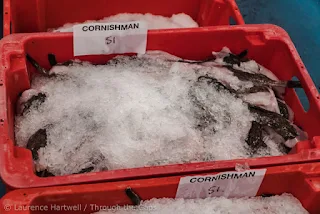Here is a letter sent to Nigel Gooding at Defra, September 2017 after the UK had voted to leave the UK at a time when fishermen wanted to now what would a post Brexit world look like..
The question, was in response to the UK Government's stated aspiration to become a "gold standard" fisheries nation which seemingly hasn't, as yet, instigated the necessary infrastructure to facilitate an agreement on shared stocks and their management. This is something that should have been in place in the event of the fishing industries desired, "No deal"
"The EU referendum and the majority vote to leave the EU was met with jubilation from the UK fishing industry, and has been characterised by many as "a sea of opportunity". The BIG question now is in what manner this "sea of opportunity" is to be realised for the fishermen of the UK? The benefits of leaving the EU, and the infamous CFP are numerous; and should empower the UK Government to design, and implement a fisheries management system that works for both fish resources, and the fishermen that depend upon them. The business of fishing has never been plain sailing, and a "Fisheries Brexit" doesn't seem like being an easy affair either.
The media coverage of Michael Gove's recent visit to Denmark; where he gave "assurance" to Danish fishermen that they would still have access to UK waters post-Brexit, has been seen by many as yet another sell out of the fishing industry. Also, the reported clash between Michael Gove and Chancellor Philip Hammond over the use of fisheries as a bargaining chip in the wider Brexit negotiations has done little to lessen their fears. Both Chancellor Angela Merkel and President Emmanuel Macron have expressed that they will fight for their respective fishing industries to achieve the best possible post-Brexit deal. This has left many UK fishermen in a state of shock and disbelief, fearing now that the industry will once again be used as a pawn in achieving a favourable Brexit deal with the EU. It must be made absolutely clear that the UK post-Brexit WILL have an exclusive 200nm/ median line economic zone; and the UK fishing industry, finally will have exclusive access to the UK territorial seas out to 12 nm.
The UK Government will have the absolute power to decide on who will be granted access, and under what conditions. Granting of reciprocal access to foreign vessels is a common practice in bilateral fisheries negotiations; where access can be granted on historical use of the area, quota swaps, and or, if there are exploitation pattern gains to be had in relation to catching older and larger fish.
It is a common acknowledgment within the fishing industry, that everything is paid for by what is caught in the net, and landed on the market. The main focus for the catching sector, irrespective of Brexit is to identify exclusive UK stocks, and quantify zonal attachment for stocks that are deemed to be shared.
Realigning Relative State allocations in relation to ecosystem creep is of utmost importance; as a means of mitigating the possibility for chokes species such as NS hake, and area VIIE haddock and VIID cod. This is especially important in respect to the Landings Obligation/Discard Ban, which comes into full force in 2019.
The UK government has commissioned work into mapping the extent of zonal attachment for stocks shared with the EU and other parties such as Norway/Faeroe. This is an assignment that the UK should not pursue alone, if there is to be any chance of reaching a consensus and ratification by all parts. This work needs to be undertaken in a joint EU-UK working group, and under the scrutiny of an unbiased third party such as ICES, and with observers from countries such as USA and Canada. ICES have informed that they have not received any request from the UK Government to assist in this important and necessary work on defining zonal attachment.
Should the Government decide to use UK fish resources as a bargaining chip, then it's important to quantify how much fish, and for what it is being traded for"
Do we have an answer yet from Defra? Where is the UK today on this crucial aspect of Brexit and the UK fishing industry?
































